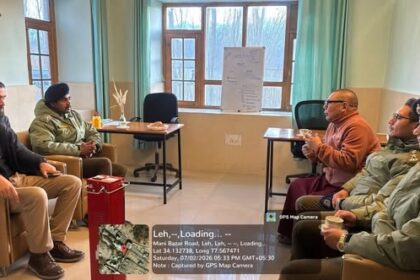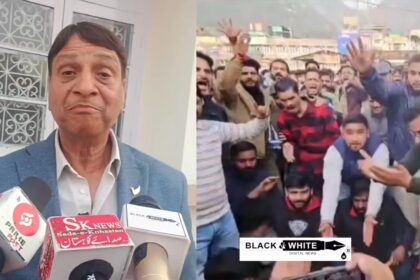Kashmiri activist, Former DGP JKP S.P Vaid allege 600 SSG commandos have infiltrated J&K.
Indian Army’s Countermeasures: Operation Serp Vanish 2.0…
||Black and White Digital News||
||Parvinder Singh August 02,2024 ||
Jammu: In a startling development, concerns have emerged regarding a potential covert operation by Pakistan in the volatile region of Jammu and Kashmir. Kashmiri activist Amjad Ayub Mirza and former Jammu and Kashmir Director General of Police (DGP) Shesh Paul Vaid have brought to light allegations of large-scale infiltration by Pakistani Special Service Group (SSG) commandos, triggering fears reminiscent of the Kargil conflict of 1999.
In a recent post on X, Mirza asserted that Major General Adil Rehmani, the General Officer Commanding (GOC) of Pakistan’s SSG, is orchestrating an aggressive offensive from Muzaffarabad. According to Mirza, approximately 600 SSG commandos have infiltrated the Kupwara region and other parts of Jammu and Kashmir, aided by local jihadi sleeper cells. This claim, if verified, marks a significant escalation in cross-border hostilities.
“Maj General Adil Rehmani of SSG is located inside Muzaffarabad and is conducting the new offensive against India. One SSG battalion under Lt Col. Shahid Saleem Janjua has already entered Indian territory and is conducting high-velocity attacks on Indian security forces. Two more battalions are in Muzaffarabad, ready to enter India via Jammu and Kashmir. This attack is being conducted directly by the Pakistan Army,” Mirza told ANI.
The alleged infiltration suggests a calculated move to engage the Indian Army’s 15 Corps, with Lt. Col. Shahid Saleem Janjua reportedly leading these operations within Indian territory. The deployment of two additional SSG battalions in Muzaffarabad, poised to enter Indian soil, underscores the gravity of the situation.
Former J&K DGP Shesh Paul Vaid has corroborated these claims. In a video posted on X, Vaid emphasized, “Maj General Adil Rehmani of the Pakistan Army has been organizing these attacks in Jammu and Kashmir recently. The presence of approximately 600 SSG commandos infiltrating the region indicates a deliberate act of war. They are focusing on engaging the 15 and 16 Corps.”
Vaid also highlighted the involvement of local jihadi networks and sleeper cells supporting the infiltrating commandos. “With two additional SSG battalions on standby, this appears to be a covert war initiated by Pakistan,” he added, stressing the strategic significance of these operations.
Echoes of Kargil: Strategic Implications:
The alarming parallels to the Kargil War of 1999 cannot be ignored. During that conflict, approximately 5,000 Pakistani soldiers infiltrated Indian territory, leading to a protracted and intense military engagement. The current infiltration, if substantiated, threatens to destabilize the region once again. The Pir Panjal Range, a strategic area spanning Himachal Pradesh, Jammu & Kashmir, and Pakistan-Occupied Kashmir, remains a critical zone due to its challenging terrain, which provides natural cover for infiltrators.
In response to these developments, the Indian Army has reactivated its Village Defense Forces and launched Operation Serp Vanish 2.0. This counteroffensive, overseen by the Prime Minister’s Office and directly reported to National Security Advisor Ajit Doval and the Army Chief, aims to eradicate terrorists and Pakistani soldiers concealed in the mountainous regions. Indian troops have been deployed within an 80 km radius, securing strategic locations and targeting over-ground workers aiding the infiltrators.
Recent Terrorist Activities Complicate Security Landscape:
The security situation has been further exacerbated by recent terrorist attacks. On June 9, terrorists targeted a bus in Jammu’s Reasi district, resulting in nine fatalities. Hakam Deen, an over-ground worker, was apprehended for aiding the terrorists. Subsequent attacks in Kathua, Doda district, and Kulgam have compounded the region’s volatility, reflecting growing discontent from Pakistan and terrorist groups over India’s recent electoral outcomes.
Looking Ahead: Stability Amid Uncertainty:
The Indian Army’s intensified efforts aim to stabilize the region and prevent large-scale conflicts, drawing historical parallels to the Kargil War. However, the situation remains fluid and volatile, with ongoing efforts to address the multifaceted security challenges posed by these alleged covert operations.
As these developments unfold, the international community watches closely, mindful of the delicate balance of peace and conflict in South Asia. The allegations of a covert Pakistani operation in Jammu and Kashmir, if confirmed, could have far-reaching implications, underscoring the persistent volatility in the region and the ever-present specter of conflict.
The revelations by Amjad Ayub Mirza and Shesh Paul Vaid have brought to the forefront a potential crisis in Jammu and Kashmir. The Indian Army’s swift response with Operation Serp Vanish 2.0 underscores the seriousness of the situation. As the region braces for possible escalations, the need for vigilance and robust defense mechanisms remains paramount to safeguard India’s sovereignty and maintain regional stability.
Leave a comment
You Might Also Like
SSP Leh Along with District Officials Visit De-Addiction Centre Leh, Encourage Patients Towards Recovery and Rehabilitation
SSP Leh Along with District Officials Visit De-Addiction Centre Leh, Encourage Patients Towards Recovery and Rehabilitation Leh, Feb 9: Today,…
1 Min Read
Katra Roop Way Bun Kar Rehega MLA Katra Baldev Raj Sharma Ka Bayan Me Jeeta He Isi Promise Pe Hu
Katra Roop Way Bun Kar Rehega MLA Katra Baldev Raj Sharma Ka Bayan Me Jeeta He Isi Promise Pe Hu…
0 Min Read
PDP Na BJP K Sath Alliance Na Kiya Hota Aaj Article 370 Bhi Hota Aur J&K Ki Halat Bhi Behtar Hoti Nc Senior Leader Mubarak Gul
PDP Na BJP K Sath Alliance Na Kiya Hota Aaj Article 370 Bhi Hota Aur J&K Ki Halat Bhi Behtar…
0 Min Read
Implementation of Rural Development Schemes Concludes at Leh
Implementation of Rural Development Schemes Concludes at Leh Leh, February 07, 2026: The three-day State-Level Training Programme on Effective Implementation…
2 Min Read









